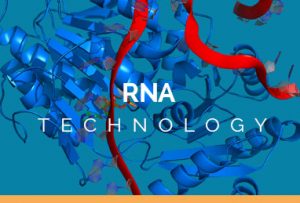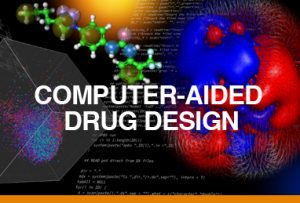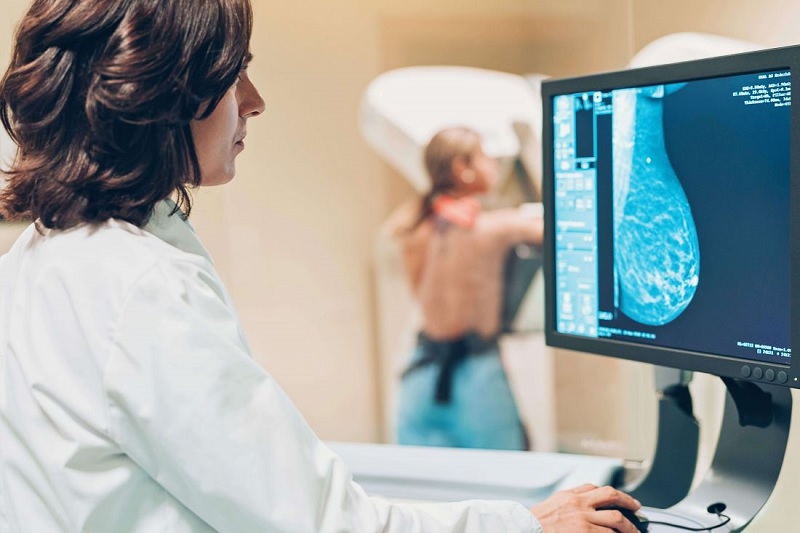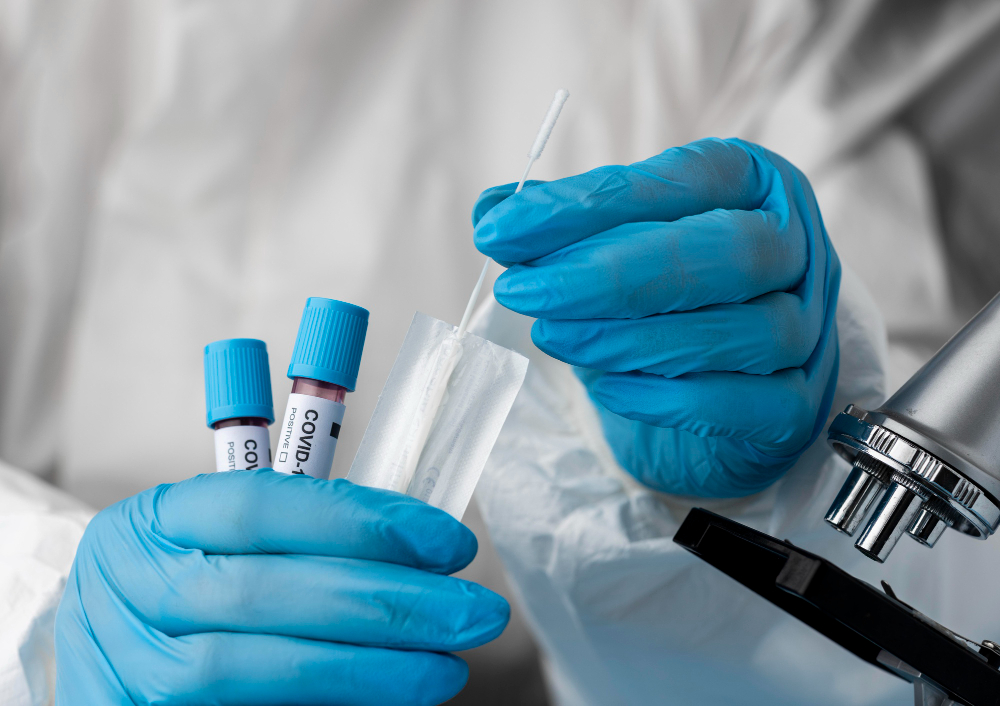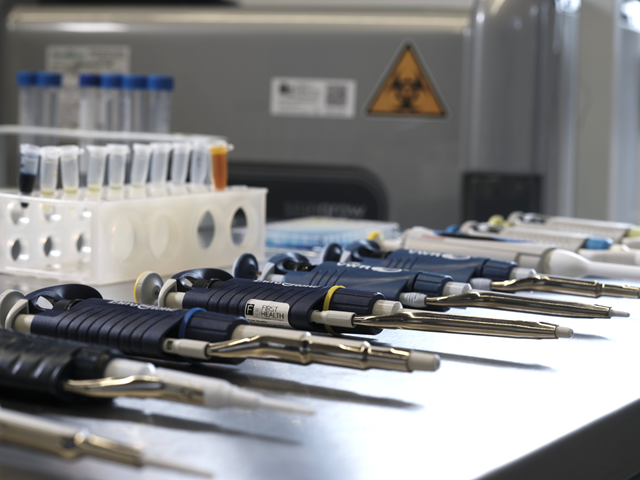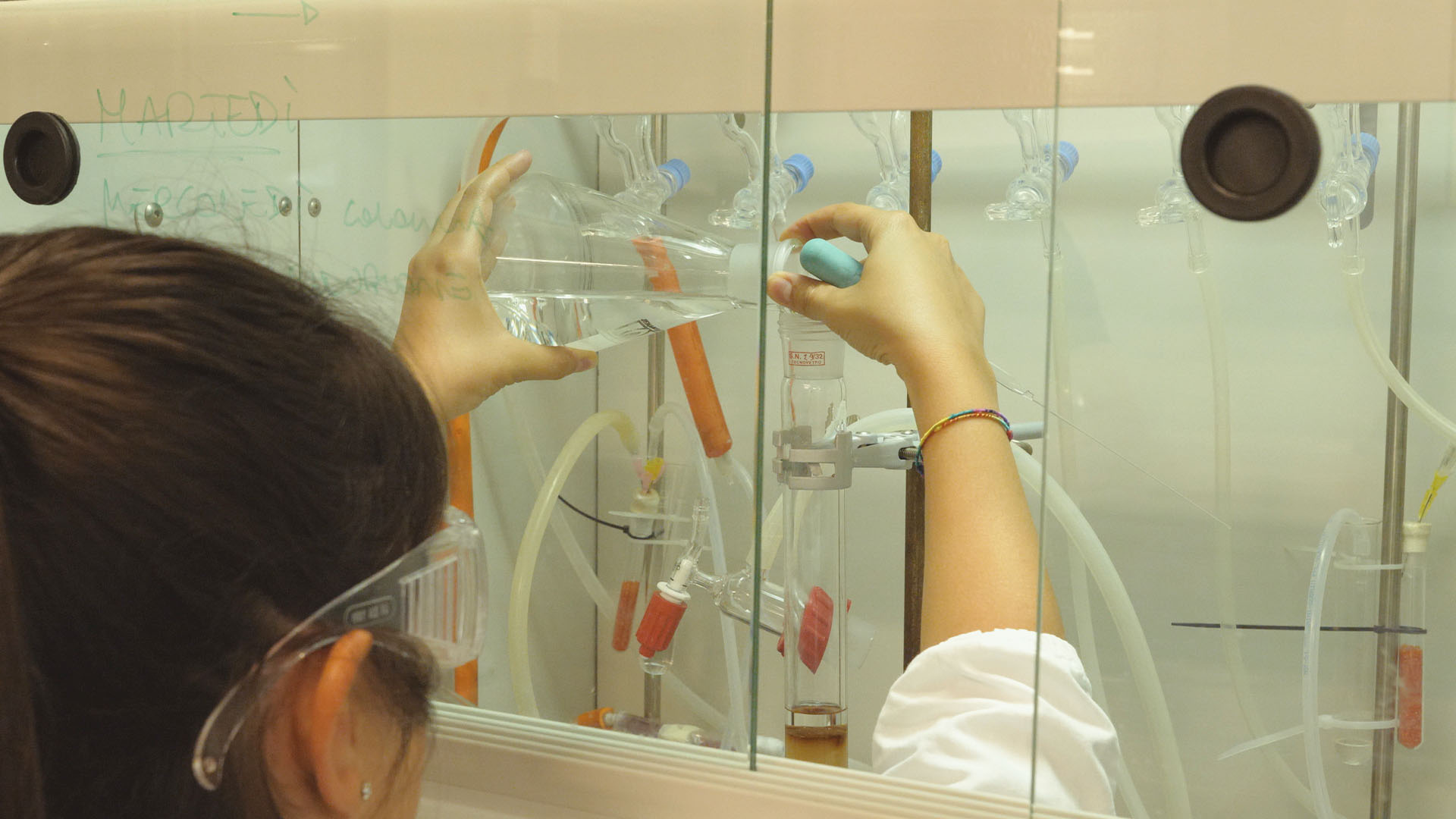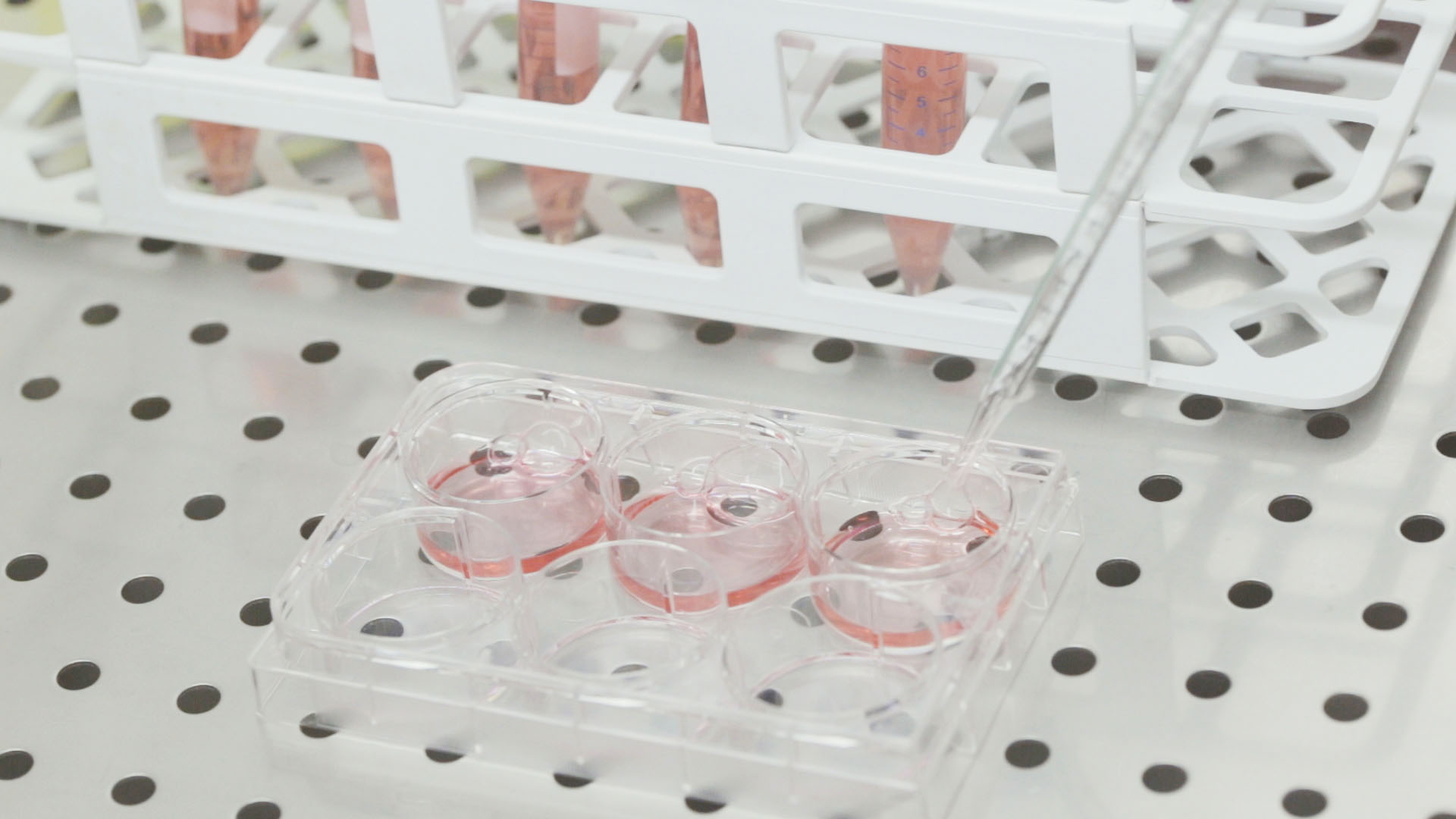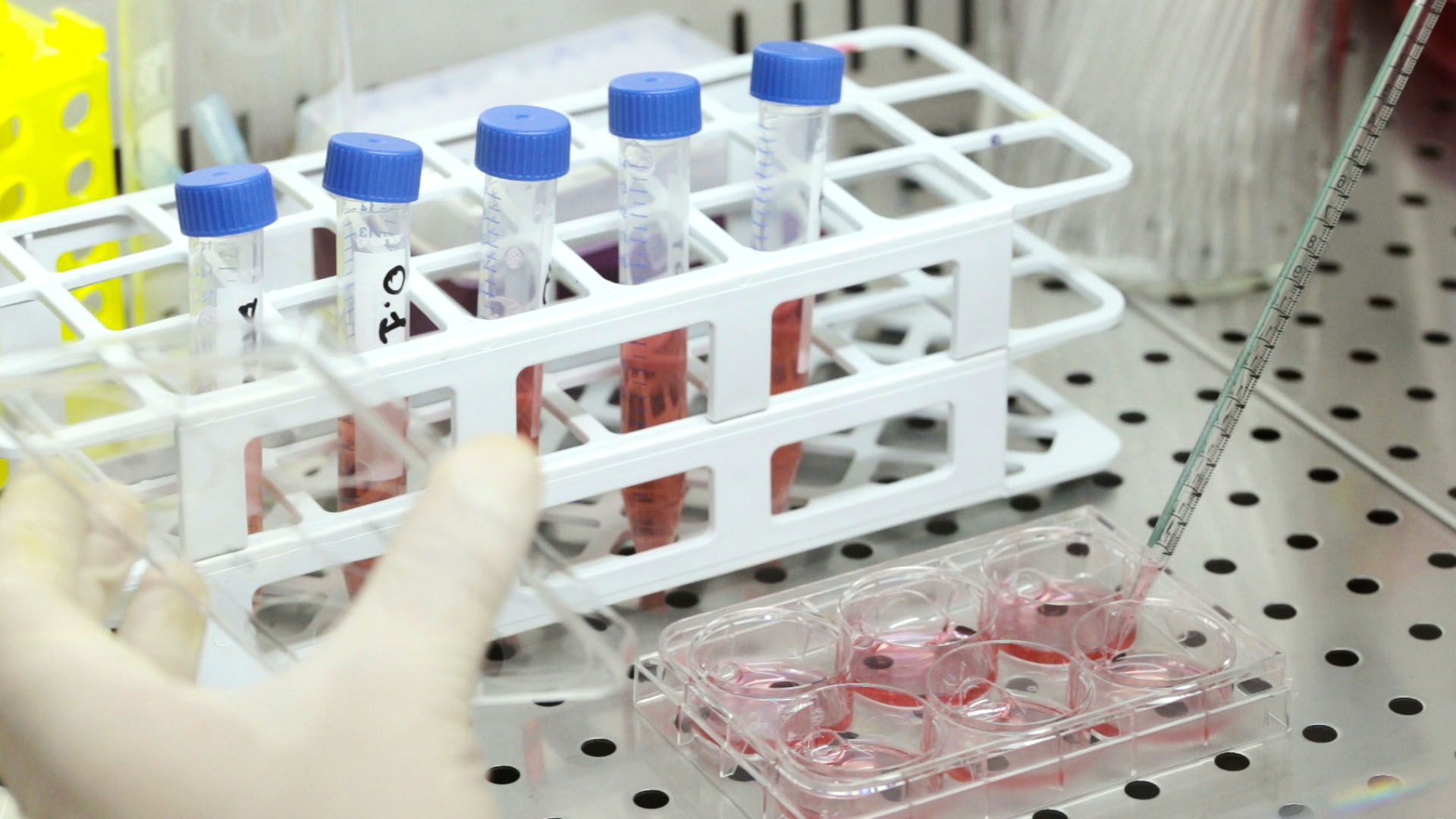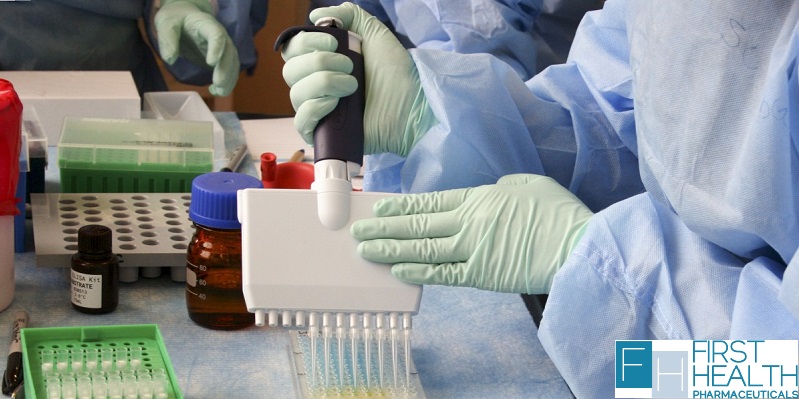RNA TECHNOLOGY
First Health Pharmaceuticals has set its RNA Research priorities on the development of RNA Helicase inhibiting lead compounds
WHY RNA-BASED RESEARCH?
RNA molecules are a small and versatile tool to transport information within the cell and the organism, thus RNA represents an optimal way for viruses to store all the necessary information for their survival and replication in a minimal space and with minimal complexity.
Furthermore, the translation of RNA to proteins is fundamental for cell survival and replication, thus it is not surprising that RNA-related pathways are altered in pathological conditions as hyperproliferative diseases.
There have been identified several partners of RNA which contribute to transport, folding, unwinding, protection, lysis, expression and all its life cycle. Although the information carried is read from one strand of RNA, folding and annealing to double strand RNA is used to protect the molecule from lysis and to add a second structure for further recognition by partners. Therefore, a crucial step in the RNA molecule life cycle is the unfolding of double strand loops or molecules.
TRANSLATION INHIBITORS
RNA helicases rearrange RNA secondary structure and RNA-protein interactions in an ATP-dependent reaction, performing crucial functions in all aspects of RNA metabolism.
DDX3 is part of the DEAD box proteins involved in RNA metabolism. Our DDX3 RNA Helicase inhibiting class of compounds do not target viral proteins but temporarily inhibit an enzyme of our own RNA cell biology that is of vital importance for the virus during its reproduction cycle. DDX3 RNA helicase has also remarkable oncogenic properties. Its overexpression has been verified in various forms of cancer, among which the most malignant types of Breast and Lung cancer.
DRUG DESIGN
Through the use of proprietary software, statistical analysis tools and machine learning algorithms, backed by substantial computer hardware facilities, First Health Pharmaceuticals brought computational drug development to an entirely new level
CLASSICAL AND CUTTING-EDGE DRUG DESIGN
First Health Pharmaceuticals’ approach is a connubium of both “classical” and cutting edge Computer Aided Drug Design techniques and algorithms, which makes it possible to minimize the attrition rate of our drug discovery programs. Classical techniques such as pharmacophore modeling and docking, which have a proven back track of successful applications, are integrated with proprietary statistical models based on Machine Learning algorithms, and modern protocols that accurately estimate the free energy of ligand / enzyme binding. The huge computational workflow involved in all of this is supported by a powerful water cooled hardware infrastructure with a total of 44 Teraflops and no less than 216 CPU core threads of calculating power.
DRUG DEVELOPMENT TECHNIQUES
Modeling of physical-chemical properties: Machine learning models (Random Forrest, Artificial Neural Network, Bayesian classifier).
Co-/Off-target identification: Reverse 3D-Pharmacophore screening of Protein Data Bank protein/ligand complexes, Polypharmacology profile by Tanimoto similarity search in PubChem/ChEMBL.
Drug re-purposing: Screening of known drugs by 3D Pharmacophore/Docking.
In silico study/understanding of protein inhibitor interaction: Metadynamics/Alchemical free energy perturbation.
FIRST HEALTH PHARMA'S APPROACH
In the last decade, the creation of publicly available data repositories such as Pubchem and ChEMBL as well as screening initiatives like the NCI Developmental Therapeutics Program (DTP) made a huge amount of drug discovery data available to the scientific community. To fruitfully mine this vast amount of information, both experienced researcher and advanced machine learning algorithms are required.
The main objective of First Health Pharmaceuticals is the identification of human RNA Helicases Inhibitors involved in both cancer pathogenesis and virus infection. By looking at the ADME (an acronym of Absorption, Distribution, Metabolism and Excretion) and physical-chemical properties from the first stages of the Research and Development (R&D) program, the research efforts are focused on the most promising compounds from the very start. The application of the aforementioned approach significantly accelerates the identification of good clinical candidates.
LOW ATTRITION RATE
Since from the early stages, First Health Pharmaceuticals research and development pipeline, integrates a series of internally developed Artificial Intelligence predictive models to monitor the principal physicochemical properties such as water solubility and membrane permeability.
The Artificial Intelligence models based on algorithms such as artificial neural network and random forest, are constantly updated with experimental data coming from the tested compounds to increase the reliability of the predictions. In advanced phases the data on physicochemical properties and ADME characterization are combined to assess the probability of success (POS) for a specific compound, identifying the the suitable candidates for the further development process.
PROJECTS
Wake up and Kill HIV
Since the publication of our Reservoir Reducing results by our partners of the Erasmus Medical Center in Nature Communications last year, several new studies by our academic partners in the Netherlands and Italy confirm these results in different assays.
The Nature paper discusses a 50% reduction of the inducible HIV reservoir after a five-day treatment with our DDX3 RNA helicase inhibitor in blood of people living with HIV (PLWHIV).
This ex-vivo experiment was carried out without the added use of a latency reversing agent (LRA) making it the first ever published result of HIV reservoir reduction through “shock and kill” in a single compound.
The fact that our DDX3 inhibitor manages to do so without inducing any toxicity justifies the definition of “wake-up and kill” as the mechanism behind the reservoir reducing properties of our compounds.
In our follow-up experiments we concentrated on the “selective killing” properties of our compounds, as this is the most challenging part of HIV Cure development and we found that the reservoir reducing properties discussed in Nature are not limited to our benchmark compound discussed in the paper, but rather translate to our entire library of DDX3 inhibiting HIV antiretrovirals (ARV) with a linear correlation to their antiviral efficacy.
*An estimated 40 million people live with HIV until their death. In 2020, an estimated 680 000 people died from HIV-related causes and 1.5 million people acquired HIV, so the population of PLWHIV continues to grow. According to the WHO, we will need to redouble our efforts to avoid the worst-case scenario of 7.7 million HIV-related deaths over the next 10 years, increasing HIV infections due to HIV service disruptions during COVID-19, and the slowing public health response to HIV.
*Source: WHO
First Health Pharmaceuticals DDX3X RNA Helicase Inhibitor compound proved successful as an Anti-Tumor agent in Breast Cancer
A study led by First Health Pharmaceuticals B.V. (FHPBV) and the Italian Institute of oncological research and prevention (ISPRO), together with the University of Siena and the Italian National Research Center (CNR) focused on assessing the antitumor activity of the FHP01 DDX3X helicase inhibitor compound developed by First Health Pharmaceuticals in in vivo breast cancer preclinical models.
FHP01 proved to be highly active against different breast cancer cell types, including triple-negative breast cancer (TNBC) models. Most importantly, the study showed that this small molecule drug candidate works effectively as a standalone treatment rather than in a combination therapy.
Read the full study – The FHP01 DDX3X Helicase Inhibitor Exerts Potent Anti-Tumor Activity In Vivo in Breast Cancer Pre-Clinical Models
Targeting DDX3X
DDX3X is an ATP-dependent RNA helicase and part of the DEAD-box helicase family and as such it is able to regulate nearly all stages of RNA metabolism, including transcription and translation. Not only has the role of DDX3X in cancer biology been confirmed, but evidence has shown that its activity is related to tumorigenesis and tumor progression, especially in some types of cancers where DDX3X is particularly overexpressed like breast cancer, head and neck squamous cell carcinoma (HNSSC), lung cancer, etc. Furthermore, DDX3X helicase has shown a high potential of targeted pharmacological approach, thus can be of huge interest especially for precision medicine.
FHP01 potential drug candidate
The individuation of a potentially successful drug candidate started with an in silico approach. After a first selection of a group of molecules through molecular docking at the RNA binding site of DDX3X, the most promising one was subsequently chosen for tests in preclinical models of breast cancer.
Results
The study concluded that by inhibiting DDX3X, the FHP01 molecular compound exerts an actual antiproliferative and killing activity against different breast cancer cell types and strongly inhibits tumor growth while showing, at the same time, no systemic toxicity but good bioavailability in vivo instead.
CoViD-19: Nasal airway epithelial cell models for an antiviral drug
Since the beginning of the pandemic, First Health Pharmaceuticals has extended its commitment to the finding of a cure for CoViD-19 also, alongside its main research focus on HIV and other RNA viruses and cancer. This commitment includes its participation in a collaborative project led by University Medical Center Utrecht (UMC) which focuses on the limitation of severe symptoms caused by CoViD-19 through the investigation of antiviral compounds acting in respiratory tract. As such, nasal airway epithelial cell cultures to be used for large scale SARS-CoV-2 antiviral drug screening are being investigated.
The aim of the project is to develop a unique CoViD-19 biobank of viral isolates and nasal airway epithelial cells from patients, which will be used to quantitate in vitro characteristics related to virus-epithelium interactions, to screen compounds, and to study correlations with mild or severe COVID-19 in patients.
First Health Pharmaceuticals has a strong expertise in the field of human RNA helicases and has identified first-in-class inhibitors for this type of enzymes with antiviral activity against various viruses. These compounds that inhibit RNA translation mechanisms, have proven to be effective against several RNA viruses and have also shown some activity against SARS-CoV-2. Participation in this current project will allow First Health Pharmaceutical to reconfirm the activity of its compounds against SARS-CoV-2 in ex vivo models with high translational value.
The proposed efforts will help to prioritise candidate antiviral drugs for further drug development, and may lead to rapid clinical testing dependent on the identified hits. Identified molecular and cellular mechanisms that associate with clinical disease may be explored for diagnostic product development. The biobank and airway culture models used in this project will broadly support (inter)national efforts to control current and future airway infections.
The “Clinically-validated nasal airway epithelial cell models for COVID19 high throughput drug development” cooperation project is co-financed with a PPP (public-private partnership) allowance that has been made available by Health Holland – Top Sector Life Sciences & Health through a TKI-LSH match.
*Image designed by Freepik
New lab facilities in Italy to expand on our existing R&D
Besides our Research and Development in The Netherlands, First Health Pharmaceuticals has important collaborations worldwide, especially in countries such as India and Italy.
Recently we opened new laboratory facilities in Colle di Val d’Elsa – Italy, where we concentrate several of our local R&D units under one roof and will also operate as a hub for our partners in the life sciences concentration around Siena. Our new lab is equipped with proprietary state of the art instruments, such as the latest spectrometers, advanced automated plate readers and cell counting equipment.
Our new Italian laboratory hosts four principal development units: Biology, Oncology, Pharmacology and Chemical Synthesis & Analysis.
While Drug Discovery will remain the exclusive competence of our Amsterdam head office, our new laboratories will expand on our existing biology, chemistry and in-vivo facilities and collaborations in The Netherlands and India.
Our Biology lab is equipped for enzymatic activity, ADME and toxicology studies. Our Oncology lab will carry out antitumor activity studies and protein characterization. Our Pharmacology lab is set-up for formulation studies and in-vivo distribution optimization. Our Chemical Synthesis lab has the latest state of the art equipment for automated high throughput synthesis, purification and analysis.
Our new laboratory facilities are part of CREA, a joint venture of several R&D companies founded by the University of Siena and operating in the Palazzone campus in the town of Colle di Val d’Elsa.
Our new laboratory reinforces our local collaborations with our long time partners; the virology research group of Siena University Hospital and ISPRO-the Tuscan cancer research institution.
First Health Pharmaceuticals joins forces with Erasmus Medical Centre on HIV Cure
The project is called “A different cure for everyone” and focuses on HIV eradication. It is a proposal coordinated by Erasmus Medical Center that encompasses investigative approaches of translational research focusing on the eradication of HIV infected cells. This cooperation project is co-financed with a PPP (public-private partnership) allowance that has been made available by Health Holland, Top Sector Life Sciences & Health and the Aidsfonds. The project also proudly hosts the collaboration of the Dutch HIV patient association the HIV Vereniging.
The Shock & Kill approach aims to reactivate the dormant HIV infected cells – the so-called HIV reservoir – and subsequently eradicate these cells by means of a combination of antiretroviral drugs, host immune clearance and HIV cytolysis. First Health Pharmaceuticals will play an important role in the project by providing compounds from the company´s HIV pipeline, such as DDX3 RNA Helicase inhibitors, TLR7 agonists and novel generations of antiretroviral agents, all having a high potential to contrast HIV reservoir formation and maintenance.
The DDX3 RNA Helicase inhibitors have in fact the unique characteristics to induce reactivation of latent proviral HIV DNA and to contrast viral replication contemporarily promoting selective apoptosis of HIV infected cells, while the newest TLR7 agonists will contribute to the latency reversal (Shock) part in a multi drug approach. Within the context of the project, the latest generation of HIV Translation Inhibitors will be tested in combination strategies with existing antiretroviral drugs, TLR7 activators and other latency reversing agents in order to maximize the Shock & Kill effect. The innovative research method implemented by the cooperative research groups also wants to provide insights into the differences between the immune system of people living with HIV and the different variants of the virus they carry to track the best way to clean up the HIV reservoirs. The findings will be further developed clinically to achieve a cure for HIV.
Target2Cure: a novel investigative approach feat. Amsterdam University Medical Centre on curative HIV strategies
The project is developed by a new multi-center public-private partnership called Target2Cure which includes, among others, the Amsterdam University Medical Centre. It focuses on innovative approaches to investigate novel diagnostic tools and therapeutic approaches that can contribute to the development of curative HIV strategies. Its main objective is the characterization of the dormant HIV in latently-infected immune cells – the so-called HIV reservoir – and their removal with a combination of small molecules and antibodies. The unique characteristic of the antiviral DDX3 inhibitors that contrast viral replication without any resistance issues, stimulate latent cells reactivation and induce selective cell death of HIV infected cells, represents a promising strategy to eradicate the virus. As such the compounds of First Health Pharmaceuticals’ HIV pipeline and their potential to contrast HIV reservoirs formation and maintenance will play an important role in the project. Various laboratory and clinically relevant models will be included in the projects such as sample from people living with HIV (PLWHIV) and animal models.
Research and Development oriented towards advanced formulations-ORAL FORMULATIONS-
The modern techniques of virtual screening and drug design identify compounds with high lipophilicity, which makes the development of formulations suitable for in vivo delivery more challenging. On the other hand, lipophilic compounds have a high capacity to distribute to the organs and this constitutes an advantage for the treatment of tumors in difficult-to-access sites and for the eradication of viruses, such as HIV, scattered in different lipophilic districts of the body.
Our goal is to leverage this advantage offered by the lipophilicity of the compounds, by being able to formulate them in such a way as to allow excellent delivery and absorption, as well as excellent patient compliance. In particular for long treatments, both in oncology and for HIV, oral administration, with the lowest possible frequency of administration, is certainly the preferred method for patients. However, there are situations in which intravenous administration is preferable, to ensure complete delivery and absorption of the drug or in cases of patients with gastro-intestinal problems. We are therefore committed to finding formulations suitable for both oral and intravenous administration, using the most modern approaches, such as self-emulsifying drug delivery systems, or formulations with liposomes and nanoparticles.
Targeting resistant types of tumors: lung cancer and liver cancer
RNA helicase mechanism is key to all the cells, especially to the proliferating cells that need higher protein synthesis like cancer cells. Most of the pathways hyper activated by the major oncogenes are influenced by mechanisms and pathways mediated by DDX helicase showing how DDX helicase is actively involved in tumor pathogenesis. That is why it is no surprise that our DDX inhibitor compounds are active against several types of tumors, bearing different mutations as well as arising in different organs. It remains one of our main objective and interest to investigate if there are any characteristics that might render the tumors more or less sensitive to the compounds, including oncogene mutations or cell type, that will support clinical development of a therapy, in terms of patient selection and stratification for clinical studies, as well as synthetic lethality and combinations approach.
Lung cancer and liver cancer
FHP compounds have shown to be active against several forms of cancer, both in vitro and in vivo. Even though the data collected so far have shown broad-spectrum activity of these compounds against mechanisms which are common to all cancer cells, FHP has decided to focus on two of the most difficult-to cure types of cancer: lung cancer and liver cancer. The choice to focus mainly on these two types of cancer for the clinical development was inducted by the fact that there are very few therapeutic possibilities and a high frequency of therapy resistance for these types of tumors. Especially for the lung cancer, we are already considering to extend the immortalized and primary cell lines’ group to cover a significant number of mutations and cancer subtypes and obtain data translatable to the patients on which we can further test our compounds. Other imminent projects include some in vivo studies in subcutaneous and orthotopic xenograft models as a proof-of-principle. The first in vitro data show activity in the presence of different mutations, and the first in vivo data in subcutaneous xenografts show ability of the compounds to contrast tumor growth without signs of toxicity. Additional in vivo studies are in preparation for Q1-Q2 2021.
Interference with RNA metabolism as a means to fight CoViD19
First Health Pharmaceuticals has been investigating the activity of its compounds on the replication of various RNA viruses, therefore, no wonder that we have also successfully tested in vitro models of SAR-COV2 infection. Currently we have undertaken projects with leading clinical centers for COVID19 research and treatment in the Netherlands where the compounds are going to be tested in patient samples.
Besides assessing the activity on the replication of the virus, First Health Pharma is also committed to assess the anti-inflammatory component of the compounds which represents an important added value to counteract the more frequent comorbidity and cause of the most serious and lethal manifestations of the infection. The activity on classical mediators of inflammation and those responsible for the cardiovascular component are being investigated with our compounds. Our compounds could also be potentially active on mutations and forms of the coronavirus, as already demonstrated for HIV.
COLLABORATIONS
Considering the groundbreaking nature of the RNA Helicase targeting technology developed by our group, and the vast array of pathogens and malignancies that is targeted by our compounds, many research groups worldwide, directly or indirectly, participated in the research in our field of interest. Some of these collaborations are based on a joint development agreement.
AMSTERDAM UMC
HIV cure strategies
PARTNERSHIP: a multi-center public-private partnership (PPP) including First Health Pharmaceuticals and six high profile research groups from AUMC-Amsterdam University Medical Centre, along with other industrial and academic partners, co-financed with a PPP allowance made available by Health ~ Holland to Aidsfonds.
RESEARCH TOPIC: HIV cure strategies
OBJECTIVE: characterization of the dormant HIV in HIV reservoir and their removal with a combination of small molecules and antibodies.
DURATION: September, 2019 – September, 2023

UMC UTRECHT
CLEAR COVID-19
PARTNERSHIP: a multi-center public-private partnership (PPP) including First Health Pharmaceuticals and six high profile research groups from UUMC-Utrecht University Medical Centre, along with other industrial and academic partners, co-financed with a PPP allowance made available by Health ~ Holland to Aidsfonds.
RESEARCH TOPIC: SARS-COV2, COVID-19
OBJECTIVE: identification of approaches to treat SARS-COV2 infections including DDX3 inhibitors.
DURATION: July 2020- June 2022
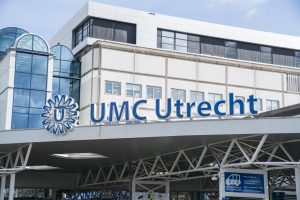
EMC - ERASMUS MEDICAL CENTER
HIV cure strategies
PARTNERSHIP: a multi-center public-private partnership (PPP) including First Health Pharmaceuticals along with Viiv Healthcare, Erasmus MC, UMC Utrecht, co-financed with a PPP allowance made available by Health ~ Holland to Aidsfonds.
RESEARCH TOPIC: HIV reservoirs reduction strategies
OBJECTIVE: developing different approaches to reduce the HIV reservoir by taking into account variation in the immune system and the virus.
DURATION: May, 2019 – September, 2023
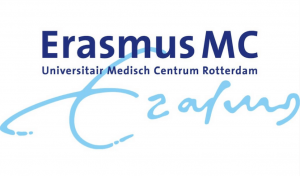
ONCODE INSTITUTE
Cancer treatment
PARTNERSHIP: First Health Pharmaceuticals and an Oncode Institute-affiliate
RESEARCH TOPIC: Glioblastoma, lung, breast cancer
OBJECTIVE: cancer research focused on advanced molecular oncology, translational research.
DURATION: May, 2019 – ongoing
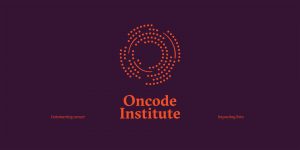
ISTITUTO TOSCANO TUMORI
Breast cancer
PARTNERSHIP: First Health Pharmaceuticals and ITT – Istituto Toscano Tumori
RESEARCH TOPIC: Breast, Lung and CNS cancer
OBJECTIVE: assessing the in vivo activity of the compounds in predictive animal models of various cancers, in particular breast, lung cancer and glioblastoma; investigation of the mechanisms of action and potential biomarkers
DURATION: 2016 – ongoing
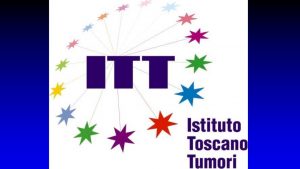
AMSTERDAM UMC
Dengue virus
PARTNERSHIP: First Health Pharmaceuticals and AUMC-Amsterdam University Medical Center
RESEARCH TOPIC: Dengue virus
OBJECTIVE: activity of DDX3 inhibitors in models of Dengue virus infection and Cytokine Storm
DURATION: 2017 – ongoing

UNIVERSITY OF MILAN
DDX3 Inhibitors in cancer
PARTNERSHIP: First Health Pharmaceuticals and the Department of Medical Biotechnologies and Translational Medicine (BioMeTra) of University of Milan, alongside the Unit of Clinical and Experimental Immunology, Humanitas Clinical and Research Center, Milan, Italy.
RESEARCH TOPIC: DDX3 inhibition in cancer
OBJECTIVE: Assessment of the effects of a DDX3-inhibitor (DDX3-inh) on ECFCs obtained from cKS patients to investigate efficacy of DDX3 inhibition on ECFC.
DURATION: 2018 – ongoing
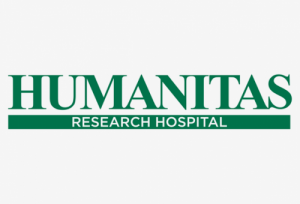
UNIVERSITY OF SIENA
DDX3 Inhibitors in cancer
PARTNERSHIP: First Health Pharmaceuticals, Department of Medical Biotechnologies and Department of Medicinal Chemistry of University of Siena.
RESEARCH TOPIC: DDX3 Inhibitors
OBJECTIVE: the role of translation inhibiting compounds (DDX3 inhibitors)
DURATION: 2015 – 2017

Past collaborations
Over the years, many highly specialised research groups around the world have been interested in testing our compounds, in order to gain more insight in the complex cellular RNA helicase biochemistry, related to the pathogens they are working on. We, from our side, also learn many new things about our field of research, but even in cases in which no direct benefit is to be expected for our company, we still aim to satisfy all requests that reach us from interested academic groups. We would like to specify that these groups are not affiliated to our company and neither do we wish to make statements about, or make any claims regarding the outcome of the research in question. We express our gratitude towards each of these highly respected groups that tested or continue to investigate our compounds. Some of the academic groups which researched the biological activity of our compounds are mentioned below.
- University of Cambridge, Virology division, UK / Norovirus
- US Army Medical Research Institute of Infectious Diseases, USA Ebola virus
- University of Glasgow, UK / HCV
- Nanjing Agricultural University, PRC / Japanese Encephalitis Virus
- University of Rome La Cattolica del Sacro Cuore, IT / Toxicity and metabolism
- John Hopkins University Hospital, USA / Breast Cancer
- CNR – Italian National Research Centre, IT / HIV
- Institut Pasteur, Lyon, FR / Ebola virus
- Rega Institue, KU Leuven, BE / Flaviviruses
- UC San Diego, USA / HIV, HCV

